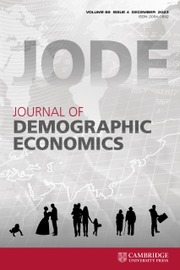According to the United Nations World Population Prospects, Africa is expected to account for more than half of the population growth in the world in the next three decades. And by the turn of the 22nd century, the populations of the poorest 33 African countries will have likely tripled. These demographic developments present challenges and opportunities for sustained growth and economic development in Africa. On the one hand, for example, they make it harder for cities to grow harmoniously, and for governments to fight poverty and inequality, while expanding health and education services. On the other hand, the potential for a demographic transition opens the door to the possibility of reaping the fruits of a demographic dividend, which was so important in the take-off of Europe towards modern growth.
A primary objective of Journal of Demographic Economics (JODE), which was launched two years ago, is to serve as a medium for economists and demographers to provide their own perspectives on pertinent topics of interest. Accordingly, this special issue of JODE contains eleven short essays by leading scholars of African Demography and Economic Development. The articles are centered around three focal points that are an integral part of Africa’s demographic and economic evolution: urbanization and the rural to urban transition; the demographic dividend; and diseases and health.
On urbanization and the rural to urban transition, all authors recognize that urbanization is inevitable in Africa, but that the transition to highly productive cities is less so. The four contributions stress key challenges faced by African countries in this transition, which are (a) to bring reliable energy and network connectivity in the cities; (b) to deal with the natural growth of cities, made possible by lower mortality, along with the challenges of the well documented urban to rural migration; (c) to address the difficult task of providing basic services in the slums, thereby alleviating urban poverty; and (d) to understand changes in rural family structures, their evolution towards more individualistic patterns, and how these changes interact with city growth.
The demographic dividend is the generic term reserved for the associated benefits of reductions in fertility. The four contributions on this topic stress the conditions for and the difficulties of harnessing a demographic dividend. They emphasize the importance of higher agricultural productivity, the creation of manufacturing jobs and the encouragement of informal sector entrepreneurship. Although these essays are optimistic on some fronts, they highlight the daunting challenges involved, such as the need to coordinate health, education and family planning policies to provoke a shift in social norms affecting the family. But the authors still share the belief that a government led contraceptive revolution is a prerequisite for a faster fertility transition. Several papers also contain methodological advances on measuring the economic dependency ratio, with the closing paper in this section combining survey data with national accounts data in order to better grasp the life cycle features of African countries.
Health is improving all over Africa, and it is right to celebrate it as an achievement of private and public efforts. It does not imply, however, that there will be a large an immediate effect on growth and development. The question of the size of the effect and of the delay in the response is discussed in the first paper in this section. The two following contributions focus on related specific aspects. (a) How the effect of parental health shocks on children can be moderated by a health insurance system; and (b) how the genetic make-up of population adjusts to the presence of malaria and mitigates its effect in the long-run. Both policy and genes mediate the effect of health on the economy.




